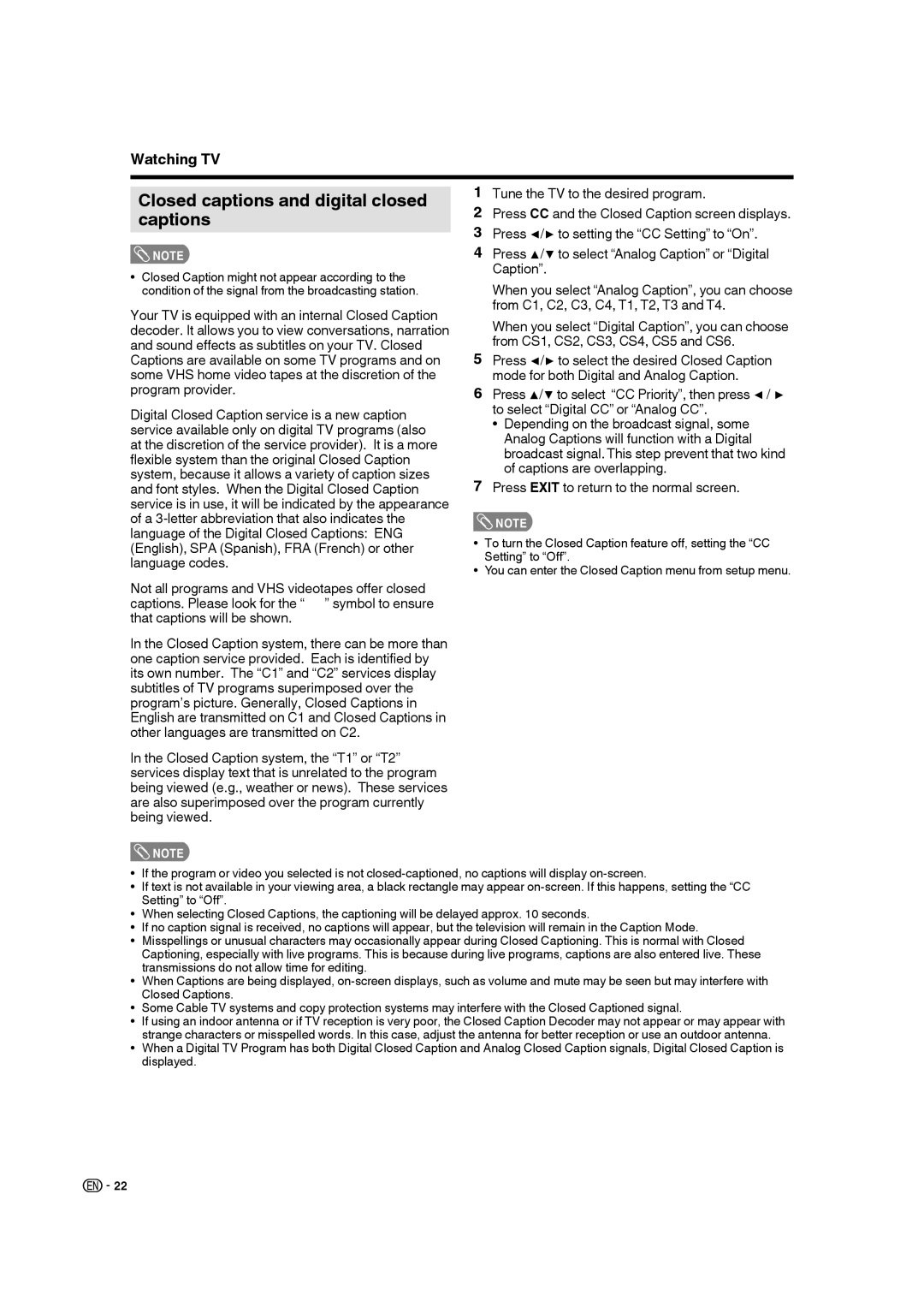
Watching TV
Closed captions and digital closed captions
![]() NOTE
NOTE
•Closed Caption might not appear according to the condition of the signal from the broadcasting station.
Your TV is equipped with an internal Closed Caption decoder. It allows you to view conversations, narration and sound effects as subtitles on your TV. Closed Captions are available on some TV programs and on some VHS home video tapes at the discretion of the program provider.
Digital Closed Caption service is a new caption service available only on digital TV programs (also at the discretion of the service provider). It is a more flexible system than the original Closed Caption system, because it allows a variety of caption sizes and font styles. When the Digital Closed Caption service is in use, it will be indicated by the appearance of a
Not all programs and VHS videotapes offer closed captions. Please look for the “ ” symbol to ensure that captions will be shown.
In the Closed Caption system, there can be more than one caption service provided. Each is identified by its own number. The “C1” and “C2” services display subtitles of TV programs superimposed over the program’s picture. Generally, Closed Captions in English are transmitted on C1 and Closed Captions in other languages are transmitted on C2.
In the Closed Caption system, the “T1” or “T2” services display text that is unrelated to the program being viewed (e.g., weather or news). These services are also superimposed over the program currently being viewed.
![]() NOTE
NOTE
1Tune the TV to the desired program.
2Press CC and the Closed Caption screen displays.
3Press ◀/▶ to setting the “CC Setting” to “On”.
4Press ▲/▼ to select “Analog Caption” or “Digital Caption”.
When you select “Analog Caption”, you can choose from C1, C2, C3, C4, T1, T2, T3 and T4.
When you select “Digital Caption”, you can choose from CS1, CS2, CS3, CS4, CS5 and CS6.
5Press ◀/▶ to select the desired Closed Caption mode for both Digital and Analog Caption.
6Press ▲/▼ to select “CC Priority”, then press ◀ / ▶ to select “Digital CC” or “Analog CC”.
•Depending on the broadcast signal, some Analog Captions will function with a Digital broadcast signal. This step prevent that two kind of captions are overlapping.
7Press EXIT to return to the normal screen.
![]() NOTE
NOTE
•To turn the Closed Caption feature off, setting the “CC Setting” to “Off”.
•You can enter the Closed Caption menu from setup menu.
•If the program or video you selected is not
•If text is not available in your viewing area, a black rectangle may appear
•When selecting Closed Captions, the captioning will be delayed approx. 10 seconds.
•If no caption signal is received, no captions will appear, but the television will remain in the Caption Mode.
•Misspellings or unusual characters may occasionally appear during Closed Captioning. This is normal with Closed Captioning, especially with live programs. This is because during live programs, captions are also entered live. These transmissions do not allow time for editing.
•When Captions are being displayed,
•Some Cable TV systems and copy protection systems may interfere with the Closed Captioned signal.
•If using an indoor antenna or if TV reception is very poor, the Closed Caption Decoder may not appear or may appear with strange characters or misspelled words. In this case, adjust the antenna for better reception or use an outdoor antenna.
•When a Digital TV Program has both Digital Closed Caption and Analog Closed Caption signals, Digital Closed Caption is displayed.
![]()
![]() 22
22
